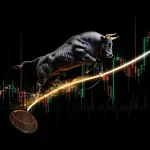
Can I Lose My 401k if the Market Crashes?
Nov 4, 2024
“What happens to my 401k when the market plummets?” This question haunts many investors, especially those nearing retirement. The fear of losing hard-earned savings in a market crash can lead to sleepless nights and hasty decisions. But is panic selling the answer, or is there a better way to navigate these turbulent times? By exploring the psychological forces at play and understanding strategic investment principles, we can uncover how to protect and even grow a 401k during market downturns.
Market crashes often trigger a cascade of fear among investors. This fear can cloud judgment, leading to impulsive actions like withdrawing funds from retirement accounts. Behavioural finance experts highlight that emotions significantly influence financial decisions. When the market dips, the instinctual reaction is to flee to safety, even if it means incurring losses.
During the 2008 financial crisis, many investors panicked as the S&P 500 plunged by over 50%. Those who sold their 401k investments locked in their losses and missed the subsequent recovery. In contrast, investors who stayed the course or strategically bought additional shares at lower prices benefited from the market rebound. This example underscores how fear can lead to detrimental financial choices that jeopardize long-term retirement goals.
Understanding 401k Investments
A 401k plan typically consists of a diversified portfolio of assets, including stocks, bonds, and mutual funds. The design of these plans aims to promote long-term growth through compound interest and market appreciation. While the value of a 401k can fluctuate with market conditions, losing all the invested money is unlikely unless an extreme event occurs.
It’s essential to recognize that market volatility is a normal part of investing. Over the long term, markets have historically trended upward despite periodic downturns. By maintaining a diversified portfolio and adhering to an investment strategy aligned with one’s risk tolerance and retirement timeline, investors can mitigate the impact of market crashes on their 401k balances.
The Role of Mass Psychology in Market Movements
Mass psychology significantly influences market trends. When investors collectively act out of fear or greed, it can amplify market movements. Herd mentality often leads individuals to follow the crowd without independent analysis. This behaviour can drive markets to irrational highs during bubbles and excessive lows during crashes.
The dot-com bubble of the late 1990s is a prime example. Investors poured money into technology stocks with little regard for fundamental valuations. When reality set in, the bubble burst, and the NASDAQ Composite Index fell by nearly 78% between 2000 and 2002. Those who succumbed to the hype suffered substantial losses, while contrarian investors who recognized the overvaluation protected their portfolios by selling at the peak or avoiding the frenzy altogether.
Technical Analysis: A Tool for Timing
Technical analysis involves studying historical price movements and patterns to predict future market behaviour. By using charts and indicators, investors can identify trends and potential reversal points. Tools like moving averages, relative strength index (RSI), and support and resistance levels help investors make informed decisions about entering or exiting positions.
For 401k investors, understanding technical analysis can aid in adjusting asset allocations. For instance, if indicators suggest an overbought market, it might be prudent to shift some investments from equities to bonds or cash equivalents. Conversely, oversold conditions can present opportunities to increase equity holdings at lower prices. Though timing the market perfectly is challenging, technical analysis can enhance decision-making and risk management.
“Buy low, sell high” is a fundamental investment principle that is often easier said than done. Market crashes can induce fear, but they also offer opportunities to purchase quality assets at discounted prices. By viewing downturns as potential buying opportunities rather than threats, investors can position their 401k portfolios for future growth.
During the 2008 crisis, investors who continued contributing to their 401k plans benefited from lower share prices. As the market recovered, these investments grew substantially. Dollar-cost averaging, the practice of investing a fixed amount at regular intervals, automatically facilitates buying more shares when prices are low and fewer when prices are high. This strategy can help mitigate the impact of volatility on a portfolio.
The Importance of Securing Profits at Peaks
While investing during downturns is advantageous, securing profits during market peaks is equally important. Recognizing inflated asset prices requires attention and a willingness to act contrary to prevailing optimism. Technical indicators can signal overbought conditions, suggesting that a correction may be on the horizon.
In the months leading up to the 2000 dot-com crash, the RSI for many technology stocks indicated overbought conditions. Investors who recognized these signals and rebalanced their 401k portfolios to reduce exposure to overvalued tech stocks preserved their gains. Selling high doesn’t mean abandoning equities entirely; it can involve reallocating to more stable assets like bonds or diversifying into different sectors.
Managing 401k Risk Through Diversification
Diversification is a cornerstone of risk management in investment portfolios. By spreading investments across various asset classes, sectors, and geographical regions, investors can reduce the impact of a decline in any single area. For 401k participants, this means selecting a mix of funds that align with their risk tolerance and retirement timeline.
Target-date funds offer a managed diversification approach, automatically adjusting the asset allocation as the target retirement date approaches. Younger investors might have a higher proportion of equities for growth, while those nearing retirement may shift toward bonds and cash equivalents for stability. Regularly reviewing and adjusting the portfolio ensures it remains aligned with individual goals and market conditions.
The Impact of Human Emotions on 401k Decisions
Emotions can significantly influence how investors manage their 401k accounts. Fear of loss might prompt withdrawing funds during a market crash, while greed could lead to overexposure in a booming market. Both reactions can be detrimental to long-term financial health.
Early withdrawals from 401k plans often accompany penalties and taxes, eroding retirement savings. Moreover, missing out on market recoveries can substantially impact the portfolio’s growth potential. By acknowledging emotional biases and adhering to a disciplined investment strategy, investors can avoid making hasty decisions that compromise their retirement goals.
Leveraging Expert Wisdom
Financial experts advocate for a measured approach to investing, especially when it comes to retirement accounts like 401k plans. Warren Buffett advises, “Our favourite holding period is forever,” highlighting the importance of a long-term perspective. Staying invested through market cycles allows investors to benefit from compound growth and recover from downturns.
John Bogle, the founder of Vanguard Group, championed low-cost index funds and diversification. His philosophy emphasizes that time in the market outweighs timing in the market. By maintaining a diversified portfolio and minimizing fees, investors can enhance their 401k performance over time.
Strategies to Protect Your 401k
Protecting a 401k from market crashes involves proactive steps and strategic planning. Here are some strategies to consider:
- Regular Portfolio Rebalancing: Adjusting the asset allocation periodically ensures the portfolio remains aligned with investment objectives and risk tolerance.
- Asset Allocation Adjustment: As retirement approaches, shifting toward more conservative investments can reduce exposure to market volatility.
- Continued Contributions: Maintaining regular contributions, especially during market downturns, leverages dollar-cost averaging and captures lower share prices.
- Avoiding Emotional Decisions: Sticking to a well-defined investment plan prevents impulsive reactions to market fluctuations.
- Consulting Financial Advisors: Professional guidance can provide personalized strategies and help navigate complex market conditions.
History shows that markets are resilient. Despite crashes and corrections, the overall trajectory has been upward. The S&P 500, for example, has delivered an average annual return of around 10% over the past several decades. Investors who remained invested through the 1987 crash, the dot-com bubble, and the 2008 crisis ultimately benefited from subsequent recoveries.
Panic selling during a crash locks in losses and prevents participation in the rebound. By staying the course and continuing to invest, especially during downturns, investors can capitalize on lower prices and enhance the long-term growth of their 401k portfolios.
Embracing a Strategic Mindset
Successfully managing a 401k amid market volatility requires a strategic mindset. This involves understanding that short-term fluctuations are normal and focusing on long-term objectives. By integrating principles from mass psychology and behavioural finance, investors can recognize when emotions are influencing their decisions and take steps to mitigate these effects.
Technical analysis can complement this approach by providing data-driven insights into market trends. While no method guarantees success, combining emotional awareness with analytical tools enhances the ability to make informed decisions that support retirement goals.
Conclusion: Navigating Market Crashes with Confidence
The fear of losing a 401k in a market crash is understandable, but with the right strategies and mindset, investors can protect and even grow their retirement savings. By avoiding panic selling, embracing strategic buying during downturns, and securing profits during market peaks, individuals can navigate the complexities of the market with confidence.
Understanding the psychological factors that drive market behaviour empowers investors to make rational decisions rather than emotional reactions. By staying informed, maintaining a diversified portfolio, and focusing on long-term goals, the question shifts from “Can I lose my 401k if the market crashes?” to “How can I make the most of market movements to enhance my retirement savings?” This proactive approach not only safeguards investments but also opens the door to opportunities that market fluctuations present.












